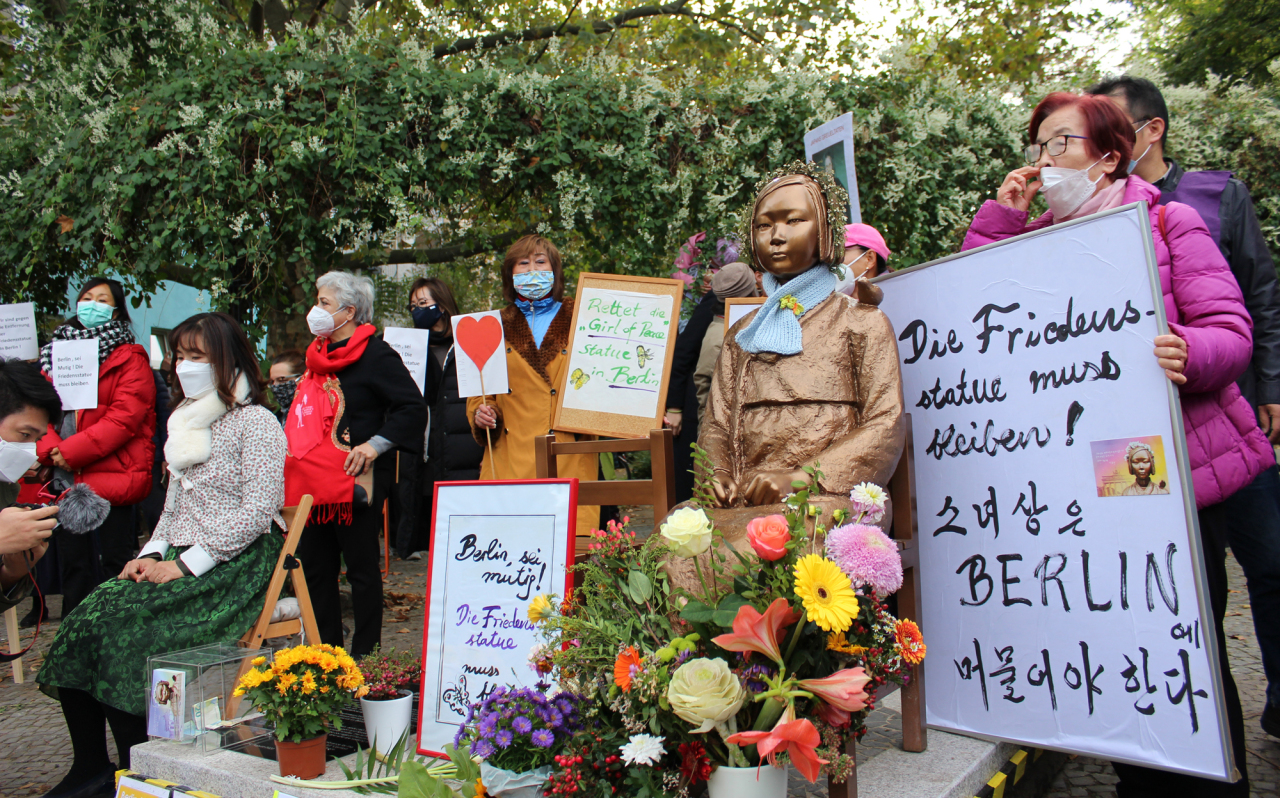Hundreds stage rally to protect 'peace statue' in Berlin
By YonhapPublished : Oct. 13, 2020 - 22:14

BERLIN -- Hundreds of people staged a rally in Berlin on Tuesday to protest a district office's order to remove a statue in the German capital symbolizing victims of Japan's wartime sexual slavery.
Some 300 activists and citizens gathered near the statue, formally called "The Statue of Peace," in Berlin's Mitte district and marched to the Mitte district office, demanding the German city authorities revoke the removal decision.
Korea Verband, a Berlin-based civic group with South Korean ties, and its supporters set up the statue in a public place in Berlin's Mitte district last month to draw international attention to the issue of wartime sexual slavery victims.
But after the Japanese government expressed regret over its installation, the Mitte district office last week ordered Korea Verband to remove the statue by Tuesday, citing an issue with the content of the statue's inscribed epitaph. The district office said it will forcibly execute the order if the removal is not finished by the deadline.
Korea Verband has filed an injunction against the order with the administrative court in Berlin.
The statue in the Mitte district is the third comfort women statue installed in Germany and the first to stand in a public place with approval from the Berlin authorities. The other two statues have been erected on private properties.
"Not only women in South Korea, but women in other Asia-Pacific countries under Japanese colonial rule during World War II suffered," said Han Jung-hwa, who heads Korea Verband. "Japan's comfort women issue is related with a universal women's human rights issue."
The sexual slavery victims, euphemistically called "comfort women," are one of the many thorny issues between the two countries stemming from Japan's 1910-45 colonial rule of the Korean Peninsula.
Historians say that around 200,000 Asian women, mostly Koreans, were forcibly sent to front-line brothels to provide sex services for Japanese soldiers during World War II. In the landmark 1993 Kono Statement of apology, Japan acknowledged for the first time that women were forcibly recruited into sexual slavery. (Yonhap)
Some 300 activists and citizens gathered near the statue, formally called "The Statue of Peace," in Berlin's Mitte district and marched to the Mitte district office, demanding the German city authorities revoke the removal decision.
Korea Verband, a Berlin-based civic group with South Korean ties, and its supporters set up the statue in a public place in Berlin's Mitte district last month to draw international attention to the issue of wartime sexual slavery victims.
But after the Japanese government expressed regret over its installation, the Mitte district office last week ordered Korea Verband to remove the statue by Tuesday, citing an issue with the content of the statue's inscribed epitaph. The district office said it will forcibly execute the order if the removal is not finished by the deadline.
Korea Verband has filed an injunction against the order with the administrative court in Berlin.
The statue in the Mitte district is the third comfort women statue installed in Germany and the first to stand in a public place with approval from the Berlin authorities. The other two statues have been erected on private properties.
"Not only women in South Korea, but women in other Asia-Pacific countries under Japanese colonial rule during World War II suffered," said Han Jung-hwa, who heads Korea Verband. "Japan's comfort women issue is related with a universal women's human rights issue."
The sexual slavery victims, euphemistically called "comfort women," are one of the many thorny issues between the two countries stemming from Japan's 1910-45 colonial rule of the Korean Peninsula.
Historians say that around 200,000 Asian women, mostly Koreans, were forcibly sent to front-line brothels to provide sex services for Japanese soldiers during World War II. In the landmark 1993 Kono Statement of apology, Japan acknowledged for the first time that women were forcibly recruited into sexual slavery. (Yonhap)





![[Herald Interview] 'Amid aging population, Korea to invite more young professionals from overseas'](http://res.heraldm.com/phpwas/restmb_idxmake.php?idx=644&simg=/content/image/2024/04/24/20240424050844_0.jpg&u=20240424200058)












![[KH Explains] Korean shipbuilding stocks rally: Real growth or bubble?](http://res.heraldm.com/phpwas/restmb_idxmake.php?idx=652&simg=/content/image/2024/04/25/20240425050656_0.jpg&u=)

